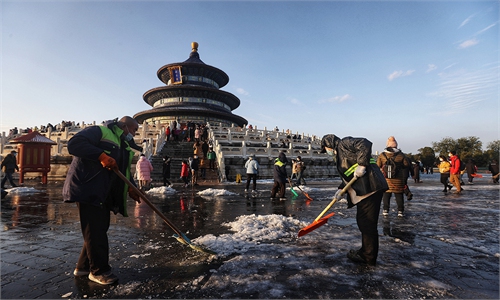
A bus runs in the snow in Guiyang City, southwest China's Guizhou Province, Dec. 26, 2021. (Xinhua/Tao Liang)
Almost 70 percent of China experienced freezing temperatures, bitter winds, ice and snow after a Siberian cold wave swept across the country from the north to the south at the weekend. Many cities endured the lowest temperatures this winter so far.
As of 8 am on Sunday, 18 provincial-level regions saw the lowest temperatures so far this year, with temperatures in Shanghai, Hangzhou in East China's Zhejiang Province and Changsha in Central China's Hunan Province falling below zero for the first time this winter.
Weather maps from the China Meteorological Administration showed the cold wave reaching the northern part of southern China areas on Sunday..
China's Central Meteorological Observatory issued alerts for heavy blizzards and a cold wave on Sunday, forecasting snowstorms in Hunan and Southwest China's Guizhou Province on Sunday and Monday. The observatory warned local residents to take precautions against the cold and slippery roads.
The blue alert for heavy blizzards was canceled later on Sunday. It is expected that rain and snow will recede across the country on Monday.
A meteorologist based in Beijing told the Global Times on Sunday that this cold wave caused by a Siberian area of high pressure is very powerful and it has affected a vast range in China from the north to the south. Some parts to the south of the Yangtze River, such as Guizhou and Hunan, even had sleet.
"The extreme weather will influence the power and energy supply in southern areas since the sleet will have negative effects on the grid and the transmission of electricity," the expert noted.
Apart from the influence on the power supply, the impact of the extreme weather on traffic is obvious. The Hunan provincial public security department posted on its official WeChat account photos of police officers in different Hunan cities maintaining traffic order on snow-covered roads.
Employees from power supply companies in many places, including Northwest China's Ningxia Hui and Xinjiang Uygur autonomous regions started maintenance work on the power grid before the cold wave arrived, and sent teams to the power equipment on time to guarantee people's access to power.

